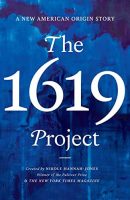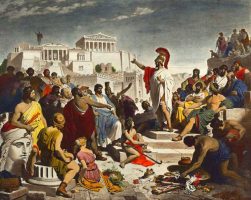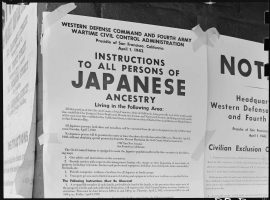
Just 30 percent of Flagler County students know the purpose of a constitution, understand the separation of powers, the concept of the rule of law, the reasons colonists rebelled against Britain, the Supreme Court ruling that ratified Jim Crow or what FDR meant by a New Deal.
The 30 percent passing rate is seven points lower than the Florida average of 37 percent in the state’s inaugural year of its Florida Civic Literacy Examination, intended to assess how well public school students understand “civic literacy.”
Students in a U.S. government course are required to take the new exam that covers everything from landmark Supreme Court cases to influential documents in American history to basic principles about how government functions.
In Flagler, 697 students took the test last school year. Only 208 passed. In neighboring Volusia, 37 percent passed, and in St. Johns, consistently the state’s best school district, 57 percent passed. St. Johns was tied with Santa Rosa County. Only one other county crossed the 50 percent threshold: Lafayette, with 53 percent. The school district with the highest percentage of students passing was a lab-school based out of Florida Atlantic University in Boca Raton. At the FAU lab school, 98 percent of 46 students passed the new civics exam.

Students can pass with at least 60 percent correct answers on the computer-based exam, which includes approximately 80 items.
There’s no specified grade level for the test, according to the Florida Department of Education. But students in 6th to 12th grades are eligible if they’re enrolled in a U.S. government course.
Statewide, the baseline results from the exam note that 58,745 students passed out of 157,091 students who took the exam in the 2021-22 school year, according to department data.
The civic literacy exam had two testing windows: Oct. 25 — December 17, 2021, and April 11 — May 27, 2022.
Bob Holladay, an adjunct professor of history with Tallahassee Community College who has been following the development of the civic literacy exam for years, told the Phoenix that he’s not “terribly upset” that there was not a high percent of students passing this year, because there’s another chance to pass the exam in college.
“37%…is that good? I mean, of course not. Of course it’s not good,” he told the Phoenix. “You want more, but this is the first year for this.”
He said it wouldn’t surprise him to see the percent of K-12 students passing the exam to increase over a couple years.
“Let this thing get in place and sort of get going for a couple of years and let’s see,” he added.
Since 2019, when Gov. Ron DeSantis came into office and initially declared his intention to require all high school seniors to take a civics exam, the road to a new civic literacy assessment has been a rocky one for both high school and college.
Previous attempts to get a statewide civic literacy exam were unpopular, with critics saying they appeared to dumb down civic literacy for Florida students.
Along with the new civic literacy exam, the Florida education system has been surrounded by debates over how civics and U.S. history should be taught in school, particularly when it comes to racism and slavery.
 In June of 2021, state education officials voted to ban materials from the New York Times’ 1619 Project from being used in classrooms and an academic lens called critical race theory from Florida classrooms.
In June of 2021, state education officials voted to ban materials from the New York Times’ 1619 Project from being used in classrooms and an academic lens called critical race theory from Florida classrooms.
Critics see the new rule as an attempt to chill and suppress frank discussions about the history of the Black experience in America.
The 1619 Project recontextualizes American history by centering the narrative around Black Americans and how slavery shaped the founding of the United States.
Meanwhile, critical race theory is a decades-old academic study that started in graduate level law schools and focuses on how laws and the justice system upholds systems of oppression, particularly when it comes to Black Americans, though the use of the term has expanded into other areas.
A month later, the state Board of Education adopted new civic standards that would shape how civics and history is taught in class. The new civic standards were also heavily criticized for ‘whitewashing’ American history in regards to racism and slavery.
According to the stated goals of the Department of Education, “Students should be able to identify, explain, interpret, and apply the principles and practices of American democracy and the republican form of government.” But while most of the questions are relatively straight-forward, some of the questions the Department of Education provides in a sample can be poorly worded, tendentious, or contain errors. And the questions asked are clearly weighed toward the more idealistic version of American history rather than its reality.

Other than obvious allusions to slavery and a single indirect allusion to women’s rights, the questions steer clear of the nation’s less admirable legacies regarding labor, immigration, economic inequality and disenfranchisement. The test is silent on the genocide of Native Americans (or on Native Americans, period) and projects due process, religious liberties and natural rights as settled achievements or assumptions rather than works in progress.
One question, for example, reads: “During the 6th century B.C.E., the ancient Athenians divided the powers of their government between two assemblies and guaranteed certain political rights to all male citizens. How do these political reforms best illustrate how societies develop?”
The question implies that Athenian democracy was representative. It was not: less than a third of its population enjoyed the rights of citizenship. The question implies that Athenian democracy resembled the American bi-cameral system. It did not. Only one assembly ruled during the 6th century B.C. A separate body was added at the end of the century not to check or balance the assembly’s power, as in the American system, but to guide it. The correct answer to the question, according to the test, is that the Athenian system illustrated how societies develop “by limiting government authority.” But that’s an anachronism, imposing modern ideology on a time when “limiting government” was not only not a part of the civic conversation: it was the reverse. There was no higher purpose than politics, government and government service in Athens.
Another question quotes the preamble to the Constitution and asks “Which philosophical movement best reflects the ideals in the passage.” The correct answer, according to the state, is “Enlightenment,” to the exclusion of “Reformation” or “Progressivism,” yet most reforms and the progressivism of the first part of the 20th century reflected the ideals of “a more perfect union” no less. The question, in other words, interprets the preamble as stuck in time rather than applicable to subsequent history, and would unfairly penalize students who see it as modern scholarship sees it.

Yet another question asks which Supreme Court case “resulted in a decision that undermined civil rights and liberties in prioritization of national security?” The desired answer is Korematsu v. United States, the 1944 decision ratifying the internment in concentration camps of over 100,000 American citizens of Japanese descent during World War II.
As historians have shown since, and many opponents of internment knew then, including three dissenters in the Supreme Court decision, it wasn’t national security that was being prioritized, but a national policy of racism no different than other court decisions such as Plessy v. Ferguson and the Dred Scott case, also figuring in questions on the same test. (It wasn’t until 2018 that the Supreme Court repudiated Korematsu, but in the same decision that ratified the Trump administration’s ban on largely Muslim citizens’ ability to travel to the United States.)
Some questions are nonsensical, more fit for Jeopardy than a civics test (a student’s critical thinking or insights are not revealed by knowing “Which article of the U.S. Constitution”–the first, second, third or fourth–“grants the power to coin money, make treaties, and levy import duties”). A question that ties the Mayflower Compact to “equal protection under the law” is a fanciful stretch that turns an instrument of control in a rigidly governed colony, where dissent was not tolerated, into a beacon of equality.
–FlaglerLive and Florida Phoenix





























A.j says
Teacher shortage. Money for education is probably less than what we need. That 8s a formula for substandard results. From my understanding the test is new, so probably the scores will increase as time go on. Usually Republican decisions are not the best decisions. The insurrection was a bad bloody decision by the Repubs. Taking away a woman’s right to have an abortion. Huge tax cuts for the filthy rich countries. No water for people standing in line to vote. The negative list is very long.
A.j says
Tax for the filthy rich companies.
Rxx says
Florida politics in action.
Andy B says
Maybe more time on civics, social studies, history, math, science, etc? Less time on – wait the ND POLICE will censor me again. No freedom of speech here.
Ld says
School board and superintendent need to evaluate adequacy of instruction and reinforcement tutoring for civics, math, English, drug abuse prevention, personal health and safety and implement programs to really help students now. Provide transportation to after school programs. Quit wasting time on unimportant items like dress code. Provide opportunities for kids to update all childhood vaccines at school. Check egos at the door and listen to what is being said by this forum and parent and student input and state score info.
Carvalho says
We just had four years of a moron who definitely failed the same tests. Maybe they can all run for president!!!
KMedley says
Honestly, I am not shocked. The percentage was about the same in 2009 when I took a college level government and civics class. I was the only student to score 100 percent on a 10 question citizenship quiz.
Leila says
Sadly, this ignorance is Nationwide.
DMFinFlorida says
And earlier this week it was reported that fewer than 50% reached expected competency in English language skills.
This is completely unacceptable, and a complicated mess with no easy fix. I come from a family with several educators (most now retired) and can assure you if those were the testing results in our districts the parents would be carrying torches in the streets. Talk about dumbing down America!
I don’t understand how half these kids get accepted into college if this is the norm. Don’t jump to blame the teachers. Until you have spent at least a few weeks in a classroom yourself, you do not understand the challenges teachers face now compared to a generation or two ago. They are dealing with drug use, dysfunctional families with physical and mental abuse, kids who go to school not having had a meal, being told they must get a weapons permit to protect the kids (who would have thought when you went to college to be an elementary school teacher that one of your courses would have to be handling firearms??!!). My father did, but he was a USMC vet … whole different work environment.
Others comment on this forum about how great Florida’s education system is thanks to the current governor, what a role model we are. If this is a role model, I am damned glad my children are long since graduated. I acknowledge that the pandemic and distance learning had a measurable impact on these statistics, but if you look at the associated reports and charts, this is not a new problem.
Adios Woolbright and McDonald. I hope the newly elected members of the School Board will work together to fix this problem that you two certainly helped create with your personal agendas.
RepublicanPlanWorking says
Does this surprise anyone? It’s the Republican plan. Keep them stupid and uninformed. Makes them more likely to fall into Nazism, brain washing, and believe conspiracies and lies. Why challenge anyone, teach them history, our government, or how to have their own opinion and beliefs. They might “gasp” turn into a liberal. “Shudders.”
Samuel L. Bronkowitz says
Before you lambast the teachers and clutch your pearls while railing against people that make practically nothing in exchange for educating the next generation, perhaps you might want to spend some time thinking about who exactly defines the curriculum taught at schools in florida (hint: it’s Manny Diaz Jr. and the florida legislature) and ask yourself who benefits from a population that doesn’t understand civics (hint: it’s the same people).
Wallingford says
Maybe the Florida Department of Education, and its policies, should be scrutinized more thoroughly since it is obviously failing. It should be non-political and independent of the whims of our esteemed Governor. They are not preparing our students for life in the global world
Wow says
Probably smarter than their parents, too.
bob says
does this help explain the numerous MAGA confused thinkers and their patriot beliefs
bob says
missed 1 question: https://cptl.asu.edu/civic-literacy-test ( graduated high school back in 65 )
Jimbo99 says
One would have to be stupid not to pass this level of a test. This has nothing to do with CRT & racism. Just answer some factual questions about how many Representatives & Senators there are. What geographical border questions there are. Really, 70% of Flagler county students can’t get 60% of these questions correct. I took the sections and passed with a near perfect score. This decades after any civics classes K-12, no refresher course or study. Very little has changed over that time for a majority of the answers to the questions. I’ll say it, if one can’t pass this test, they shouldn’t be voting, even call themselves a US citizen. I get not doing your homework in your own vetting process for the candidates to vote in every election, but this is just basic non-offensive, non-triggering history & geography questions.
https://cptl.asu.edu/civic-literacy-test
Denali says
If that test is indicative of the one these kids failed, they have been failed by our education system. Something has happened in the last half century. Back in the 60’s we took a test very similar to this our junior year and if you did not pass with 80% you did not graduate. Of the almost 700 of us to graduate only a handful did not cross the stage and the reasons had nothing to do with the ‘government” test. And 94% of us went on to higher education.
Oh FWIW; and not to start a contest here but I answered them all correctly. And with respect to your idea about passing this test in order to vote, while I agree with your sentiment; it would never make it through the courts.
J.T says
I took this test as a senior at FPCHS, and passed it with a 93. I knew a lot of the stuff, but most of the poorly worded and incredibly vague and unimportant questions had to fall to the simple practice of process of elimination, which unfortunately if you master that you can ace pretty much any test, hence why I passed all of the state exams with 4s and above: this test shows almost nothing about the people taking the test, or Florida as a whole, because this was dropped on seniors across the state as a bombshell test that “didn’t affect anything, not even college placement,” so almost everybody went in there with the same mindset of not really trying that hard, because it doesn’t matter, and let’s face it, a lot of the questions had no effect of me getting a job and living comfortably, which is all that really matters at this point, sadly.
Judy says
Yet the Democrats want to lower the voting age to 16!!! Unbelievable!!
FlaglerLive says
In 1944 Benjamin Fine, the education reporter for The New York Times, won a Pulitzer for Public Service for a series of articles he reported in 1943 on the dismal state of students’ knowledge of their own history. The series began on April 4, 1943, front page of the Sunday edition (“Ignorance of U.S. History Shown by College Freshmen“) and included the following:
“College freshmen throughout the nation reveal a striking ignorance of even the most elementary aspects of United States history, and know almost nothing about many important phases of this country’s growth and development, a survey just completed by THE NEW YORK TIMES has shown. […] More impressive than the lack of knowledge is the amount of mis- information that the survey disclosed. A large majority of the college freshmen showed that they had virtually no knowledge of elementary aspects of American history. They could not identify such names as Abraham Lincoln, Thomas Jefferson, Andrew Jackson or Theodore Roosevelt, and they had little conception of the significant trends that have made the United States the nation it is today.
“[…] An analysis of the results indicates that either the college freshmen, recently out of high school, were poorly prepared on the secondary level, or they had forgotten whatever they had learned about United States history. On many aspects of American growth and development they indicated a serious lack of knowledge or understanding. Although Theodore Roosevelt’s name is important in American history, 81 per cent of the college freshmen could not cite two contributions that he had made; however, they did credit him with many obscure and fallacious contributions. Several hundred students said that he was the founder of the NRA, the WPA, and various other New Deal agencies. One student wrote that Roosevelt was famous in American life because ‘he showed that an invalid is not lost.’ Another said that he ‘walked on a big stick with a soft voice.’ Again, he was a forest ranger, head of a troop of Negroes which helped free Texas, established price ceilings, was a hero in the War of 1812, fought Pancho Villa, helped quiet the Indians, was a general in the last World War, was president during the World War, purchased Alaska, saved the country from depression, and was the first New Dealer. A student from a Western university declared that Roosevelt’s greatest contribution to the United States was that he collected ‘large quantities of animal heads.’”
JimBob says
Just for the hell of it, what are two contributions Theodore Roosevelt made to this country? No Googling! I bet you Flagler County adults would score at similar levels to their kids.
DMFinFlorida says
So true. We have traveled to several countries and find that Europeans (in particular) have a greater knowledge of American politics, civics, and current affairs than many of the everyday voting adults here in the US.
Justsayin says
According to the 2020 US census, 8 of the 10 fastest growing states were red. Florida being 8th.
If the school systems in red states are so bad, why would families move there. I am sure most will not admit it, but how many who live in the area are from a blue state.
The govenor of California in -laws moved to Florida in 2020. That should tell you alot.
Ignuit says
Maybe instead of Mom’s For Liberty where politics and religion are foremost and who also didn’t fare all that well a few days ago, a group called Mom’s For Education could be formed that deals with education and supports our educators. Remove the nonsense from board meetings and work for our kids, that’s their job. I think some of those Moms just might have been gaslighted.
Timothy Patrick Welch says
So…
lets start with the basics and build a foundation of knowledge before we postulate theories like Critical Race.
don miller says
need to suppress voters that are clueless. what was that saying? those ignorant of history will be condemned to repeat it. best to know the history to avoid and that those that don’t need not drag our freedom down with their ignorance. they have no real business voting .